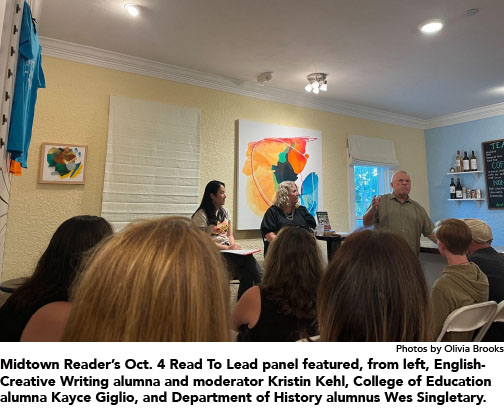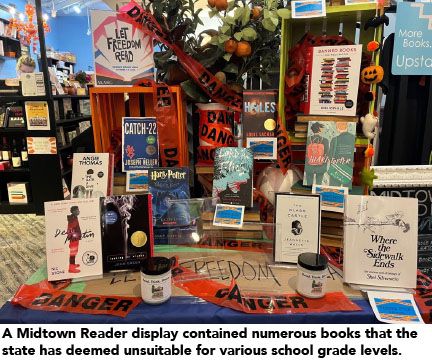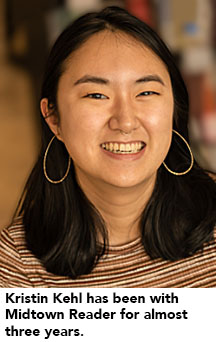FSU voices help spread awareness during Banned Books Week
By Olivia Brooks
The topic of banning books is controversial, especially in Florida.
Not only is it important to bring awareness to the ever-evolving situation in the K-12 education system, but listening to primary sources in the academic system dealing with these issues also is crucial.
At a recent discussion at Midtown Reader, a Tallahassee bookstore, three Florida State University alumni made this conversation much more inclusive to the community. English-Creative Writing alumna Kristin Kehl moderated the Read To Lead talk, and College of Education alumna Kayce Giglio and Department of History alumnus Wes Singletary joined her as panelists.
“Books expose us to different cultures and history is a tool to help us make informative decisions,” Singletary said during the discussion. “When you’re not exposed to other cultures, you don’t know who they are, and you become afraid of them.”
Bookstores, authors, and public libraries across the country celebrated Banned Books Week during the first week of October, which gave Midtown Reader the opportunity to expand on the topic. With multiple events throughout the week, such as screening The Great Gatsby and the Banned and Boozy Book Fair, a wide range of audiences were able to learn what it means for a school board to remove from a library or to discontinue access to a book or other materials in response to a a parent or resident of that county objecting to the content.
“Banned Books Week brings together the entire book community—librarians, booksellers, publishers, journalists, teachers, and readers of all types—in shared support of the freedom to seek and express ideas,” Midtown Reader’s October 1-7 newsletter stated.
According to a recent report released by the Florida Department of Education for the 2022-23 school year, the state's 67 counties registered a total of 1218 objections to specific books; many titles were flagged in multiple counties. Of that number, the counties combined to remove 308 books from shelves.
With those statistics in mind, the Oct. 4 Read To Lead panel featured Kehl, who is the general manager of Midtown Reader; Giglio, who has taught at several local K-12 schools, with the past 11 years at Tallahassee’s Leon High School as an English teacher and the school’s literacy coach; and Singletary, who teaches history at Tallahassee’s Lawton Chiles High School and serves as an adjunct history professor at Tallahassee Community College.
 Read To Lead is a regular Midtown Reader series that brings in community leaders from Tallahassee to broaden viewpoints and showcase perspectives beyond what can be found within a book’s pages.
Read To Lead is a regular Midtown Reader series that brings in community leaders from Tallahassee to broaden viewpoints and showcase perspectives beyond what can be found within a book’s pages.
The first book in discussion was Giglio’s favorite, To Kill A Mockingbird. With both a bachelor’s degree and a master’s degrees in Special Education from FSU, as well as a Specialist degree in Educational Leadership and Policy, Giglio’s perspective on why teaching this novel is built upon her time being educated as well as being the educator.
“It’s really important to teach this book because it’s a coming-of-age story, and it shows children right from wrong,” she said.
By tying a social justice unit into her curriculum, Giglio is able to teach To Kill A Mockingbird in her classes to project the content in a developmental, constructive way, and to ask students who they are and why are you who you are.
Many books that are removed from public school shelves, according to the panelists, are important stories that teach how we can empathize with other cultures and, in turn, teach how to better ourselves individually and as a society.
Singletary pointed out that how to be empathetic is a trait we can learn through reading. Although his subject of expertise is not English, the conversation context remained the same when discussing what is “allowed” to be read in the classroom.
“I do not like it when people intentionally use censorship to keep us apart and separate us,” he said. “I’m trying to turn students into students who care and have empathy.”
Kehl has been with Midtown Reader for almost three years. A Tallahassee local and lifelong reader, she finds great pride in the bookstore’s mission to be a part of greater causes, such as the Banned Book Week activities. After finishing her time as an undergraduate at FSU, she worked in a variety of career fields, but Kehl knew she wanted to move closer to her field of study, creative writing.
“It was a great coincidence that Midtown Reader was looking for a manager at the same time, and I've been here ever since,” she says.
Her contribution to the store is important, which is clear through her fluidity in moderating this panel. Kehl provided thought-provoking questions and kickstarted great conversations throughout the event, asking a question that led to keen observations: What makes a book important in the first place, specifically banned books?
The three panelists agreed that not every book is for everyone, but there is a book for everyone. They all stressed, however, that speaking out on a community level about this issue has a lasting impact.
The audience at the panel ranged demographically from high schoolers to retirees, and the voices and comments from the crowd helped the discussion flourish even further. After Kehl opened the floor to questions, one stood out above the rest: “Is there a list of what books students can read, or a list of books students cannot read?”
That is when the topic became specific. Anything that is not on the state approved list cannot be considered as material for the designated grade level or needs supervision and permission. This includes not only books, but articles, films, and any consumer media in the classroom.
“It’s a privilege (to have access to books) and sometimes we take that privilege for granted,” Giglio said, as the panel discussion neared its end.
To close the event, Kehl encouraged those present to take full advantage of the reading spaces available to everyone. One takeaway from the discussion seemed clear: Partaking in panels such as this one, with community voices heard, is essential to becoming more aware of sensitive topics.
Olivia Brooks is an English major on the editing, writing, and media track, with a minor in communication.
Follow the English department on Instagram; on Facebook; and on X.

